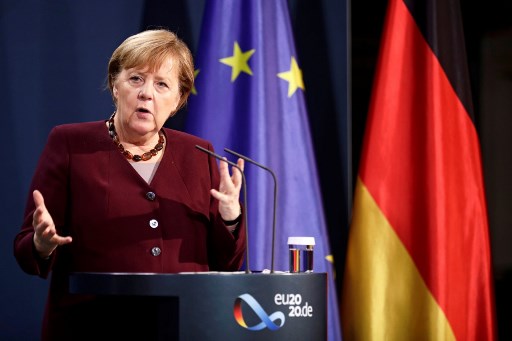
by Anuj Chopra
Agence France Presse
RIYADH, Saudi Arabia (AFP) — G20 leaders said Sunday they will “spare no effort” to ensure fair distribution of coronavirus vaccines, but the united front was punctured by Germany’s Angela Merkel who voiced concern about slow progress.
At a virtual summit hosted by Saudi Arabia, the world’s richest nations pledged resources to shore up the pandemic response, and to support poor countries whose economies have been ravaged by the crisis, but offered little detail.
The German Chancellor said she was concerned that no major vaccine agreements had yet been struck for poorer nations, even as rich countries have already bought up huge numbers of doses from pharmaceutical firms.
“We will now speak with (global vaccine alliance group) GAVI about when these negotiations will begin because I am somewhat worried that nothing has been done on that yet,” Merkel said in Berlin.
Her comment came as G20 nations pledged to “address the immediate financing needs” to support the production and fair distribution of Covid-19 vaccines, treatments and tests.
“We will spare no effort to ensure their affordable and equitable access for all people,” the group said in their closing communique.
At a news conference, Saudi Finance Minister Mohammed al-Jadaan emphasised that there was consensus among G20 nations that “if we leave any country behind, we will be behind”.
But as richer nations plan their vaccination programmes, with the US expecting to launch in early December, experts warn that developing countries face hurdles that could deny billions the first proven protection against the virus.
French President Emmanuel Macron called on his counterparts to “go further and faster” by donating doses, forging industrial partnerships and even sharing intellectual property.
Calls are mounting for the G20 to help plug a $4.5-billion funding gap in the so-called ACT-Accelerator, a mechanism led by the World Health Organization that aims to ensure access to tests, treatments and vaccines for all.
“More funding is needed,” said European Commission President Ursula von der Leyen, adding that she had called on G20 leaders to fill the gap by the end of this year.
– Virtual reality –
In the high-stakes webinar, G20 leaders struck a unified tone on supporting multilateral trade and the fight against climate change, while drawing criticism from campaigners for failing to stake out any clear action on the explosive issue of developing-nation debt.
The unusual virtual format of the summit, in place of a real-life meeting that coronavirus restrictions made impossible, has produced some awkward interactions, and deprived Saudi Arabia of an opportunity to showcase itself on the international stage.
US President Donald Trump made a brief appearance at the opening session before logging off and going golfing, while other leaders braved technical quirks and the lack of opportunity for spontaneous conversations.
Trump lauded his administration’s “historic” achievements and said he looked forward to working with the next G20 president Italy, as he refuses to concede after losing a bitter election.
The mercurial president made another splash on Sunday, defending his decision to pull out of the Paris climate accord, calling it “unfair and one-sided” and designed to kill the “American economy”.
In the communique though, the group adopted a consensus position on climate change, reiterating support for tackling “pressing” environmental challenges.
Differences within the G20 were made highly public at last year’s summit in the Japanese city of Osaka, when the United States demanded the insertion of a separate paragraph on issues such as environmental protection.
– Soaring debt –
G20 nations have contributed more than $21 billion to combat the pandemic, which has infected 56 million people globally and left 1.3 million dead, and injected $11 trillion to shore up the battered world economy, summit organisers said.
In the final statement, leaders said that in the face of an “uneven, highly uncertain” recovery they were “determined to continue to use all available policy tools as long as required to safeguard people’s lives, jobs and incomes”.
But the group faces mounting pressure to help stave off possible credit defaults among poorer nations, as their debt soars amid the economic catastrophe stoked by the virus.
The G20 has extended a debt service suspension initiative (DSSI) for developing countries until June, but the United Nations has led calls for it to be prolonged until the end of 2021.
The communique did not offer any guarantees.
Instead, G20 finance ministers will examine the recommendation when the IMF and World Bank meet next spring “if the economic and financial situation requires” an extension by another six months, they said.
With the world in disarray after months of border closures and lockdowns, the group also struck a unified tone on trade, saying that supporting a multilateral system “is now as important as ever”.
Saudi Arabia’s human rights record has cast a shadow on the gathering, as campaigners and families of jailed activists launched vigorous drives to highlight the issue.
But the issue barely surfaced over the weekend, with Western officials indicating they prefer to use bilateral forums to discuss the issue with Riyadh.
burs-sls-ac/hkb
© Agence France-Presse








